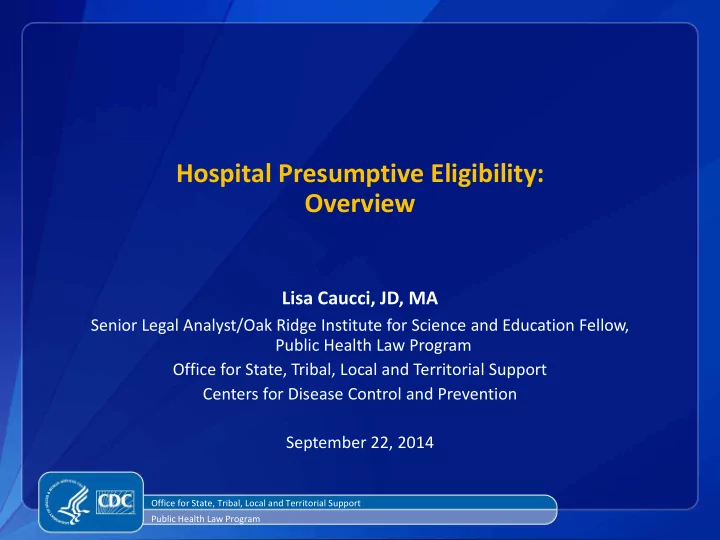

Hospital Presumptive Eligibility: Overview Lisa Caucci, JD, MA Senior Legal Analyst/Oak Ridge Institute for Science and Education Fellow, Public Health Law Program Office for State, Tribal, Local and Territorial Support Centers for Disease Control and Prevention September 22, 2014 Office for State, Tribal, Local and Territorial Support Public Health Law Program
Disclaimer The contents of this presentation do not represent official CDC determinations or policies. The findings and conclusions in this report are those of the author and do not necessarily represent the official position of CDC. The contents are for educational purposes only and are not intended as a substitute for professional legal advice. Always seek the advice of an attorney or other qualified professional with any questions you may have regarding a legal matter.
What Is Hospital Presumptive Eligibility (PE)? Allows hospitals to provide temporary Medicaid coverage to individuals likely to qualify for Medicaid Previously, option limited to children or pregnant women and available only in states that selected this option Now available as an option for qualified hospitals in every state for all individuals eligible for Medicaid on the basis of modified adjusted gross income (MAGI)
Medicaid Presumptive Eligibility State option for children and pregnant women Qualified entities asked for info about household size and income Patients likely to qualify for Medicaid are “presumed eligible” and receive immediate temporary access to care Payment for services guaranteed to providers Opportunity to encourage and assist with full Medicaid application
Medicaid Presumptive Eligibility (Cont.) Under Affordable Care Act, states that had previously adopted the PE option can expand program to other populations Parents and caretaker relatives Childless adults covered by state’s Medicaid program Former foster children Individuals seeking family-planning services
Affordable Care Act Hospital PE Program Hospital PE determinations can be made in every state regardless of whether the state had previously adopted the PE option Hospitals can make PE determinations for any individuals likely eligible for Medicaid under state guidelines, including Children Pregnant women Parents and caretaker relatives Former foster children
Affordable Care Act Hospital PE Program (Cont.) Hospital PE available to new populations if covered by state Adults with income above 133% federal poverty levels and under age 65 Individuals eligible for family planning services Individuals seeking treatment for breast or cervical cancer States can also allow hospital PE determinations for other groups, including people who are aged 65+, are blind or have disabilities, as well as groups covered by 1115 waivers
Affordable Care Act Hospital PE Program (Cont.) Hospital PE determinations can also be made for patients’ families and eligible individuals from the broader community
How Hospital PE Works Hospital employee trained in conducting hospital PE determination helps individual with application If PE is approved Hospital provides • Written eligibility notice • Beginning and end dates • Summary of benefits If PE is denied, hospital must provide reason for denial CMS recommends hospitals encourage all individuals to apply for full Medicaid, regardless of PE status
Qualified Hospitals Participate in the Medicaid program Notify the state of its intention to make PE determinations by the process specified by the state Agree to make PE determinations consistent with policies and procedures of the state
Making Hospital PE Determinations Any PE trained hospital employee may make PE determinations Includes employees in hospital-owned physician practices or clinics, even if off site Hospitals may not delegate PE determinations to third-party vendors or contractors Hospitals may use third-party contractors to support PE implementation Hospitals must notify the state of PE approvals within five days
States Must Provide qualified hospitals with training in all applicable policies and procedures related to PE Submit Medicaid State Plan Amendment outlining hospital PE implementation process State eligibility policies and procedures Training materials Hospital PE application (if using written form) Limit pregnant women to one hospital PE period per pregnancy Collect data on hospital PE performance to fulfill their oversight responsibilities
States May Require citizenship or residency self-attestations Choose application format No written application Short form Standard Medicaid application with limited questions Require hospitals to assist with full application
States May (Cont.) Require hospitals to administer knowledge tests to employees making PE determinations Limit hospital PE periods within a time span Take corrective action against hospitals But cannot disqualify hospital making PE determinations until after state has provided additional training or taken other reasonable corrective action measures to address the issue
Potential Performance Standards Proportion of individuals determined presumptively eligible by the hospital who go on to submit a full application Proportion of individuals who are ultimately determined eligible for Medicaid based on the full application
Thank you! Lisa Caucci lcaucci@cdc.gov For more information, please contact CDC’s Office for S tate, Tribal, Local and T erritorial S upport 4770 Buford Highway NE, Mailstop E-70, Atlanta, GA 30341 Telephone: 1-800-CDC-INFO (232-4636)/TTY: 1-888-232-6348 E-mail: OSTLTSfeedback@cdc.gov Web: http://www.cdc.gov/stltpublichealth The findings and conclusions in this presentation are those of the authors and do not necessarily represent the official position of the Centers for Disease Control and Prevention. Office for State, Tribal, Local and Territorial Support Public Health Law Program
Recommend
More recommend